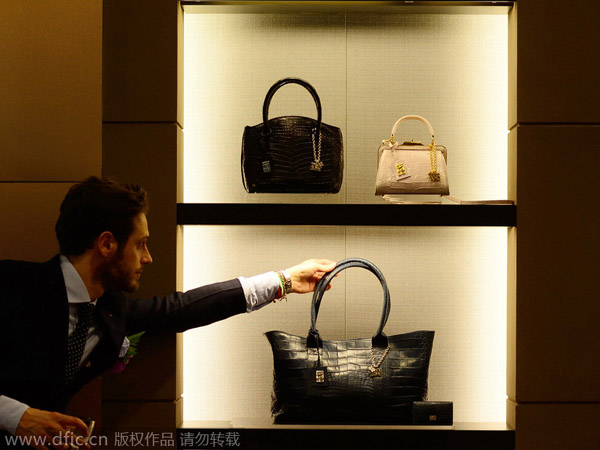Anti-corruption campaign will boost economy
By Yao Shujie and Wang Feng (chinadaily.com.cn) Updated: 2015-03-09 07:54
 |
|
A employee puts a handbag on the display shelf in a store in Hangzhou, Zhejiang in May 18, 2013. [Photo/IC] |
The anti-corruption drive launched by the top leader Xi Jinping and top graft-buster Wang Qishan since the 18th CPC National Congress has produced powerful shockwaves that have spread throughout the Chinese political system and society. It has also been associated with the serious economic slowdown, as the country's GDP is decelerating quickly from its breakneck growth of recent years.
This has led some people to believe that the anti-corruption campaign must have put the brakes on economic growth. Simon Denyer, The Washington Post's bureau chief in China, is one of them. In a recent article querying whether the Chinese economic system can function without corruption, he wrote "as China moves into the third year of its far-reaching anti-corruption campaign, experts and officials are worrying that without the grease of bribes, projects are stagnating and the economy is taking a hit".
Denyer suggests that the anti-corruption campaign has led some officials to take a wait-and-see attitude, reluctant to take any action that may promote economic growth because they are afraid of making any mistake and being prosecuted as a result of any possible "wrongdoing".
He quoted one Chinese scholar as saying "the problem has become so serious that Premier Li Keqiang has asked local government officials to sign a written pledge to carry out major economic and social policies faithfully as dereliction of duty has set back central government economic growth measures".
Denyer observes that the anti-corruption campaign has hit sales of luxury goods and the business activities of high-end restaurants and hotels.
In sharp contrast to Denyer's article, an opinion piece was published on the home page of the CPC's Central Commission for Discipline and Inspection website, arguing that such claims are misleading and counterfactual, as the recent economic slowdown has not been caused by the anti-corruption campaign, but by the government's efforts to restructure the distorted economy after a long period of rapid expansion and other factors such as the tough external environment, the rising costs of production, the need to control pollution and domestic currency appreciation.
China's GDP growth of 7.4 percent, with an absolute increase of $1.1 trillion in 2014, was not a bad performance. There is no doubt that China is still a potent engine of growth for the global economy.

I’ve lived in China for quite a considerable time including my graduate school years, travelled and worked in a few cities and still choose my destination taking into consideration the density of smog or PM2.5 particulate matter in the region.











